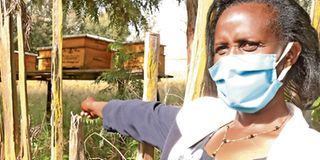She beat culture to keep bees for cash

Lily Letiwa on her farm in Samburu County where she keeps bees. From her beekeeping, she has been able to pay school fees for her four children and cater for her needs. PHOTO | GEOFFREY ONDIEKI | NATION MEDIA GROUP
What you need to know:
- In Ng'ari, Lily Letiwa's home is not different from the others, though something else makes it stands out.
- The homestead hosts acacia, eucalyptus, mango and orange trees and a greenhouse. Then under the flowery trees is a set of beehives.
- Beekeepers harvested the produce and consumed it raw due to its medicinal value and rarely sold it.
- For Letiwa, she does not use the traditional beehives made from logs, but has embraced the modern ones, particularly the Langstroth.
Dotting the landscape of Maralal in Samburu County are hundreds of manyattas and heads of cattle as residents practise pastoralism.
In Ng'ari, Lily Letiwa's home is not different from the others, though something else makes it stands out.
The homestead hosts acacia, eucalyptus, mango and orange trees and a greenhouse. Then under the flowery trees is a set of beehives.
Some years ago, women in the community were not allowed to keep bees as they were reared mainly by elderly villagers, especially those who lived in forests or along forest boundaries.
Beekeepers harvested the produce and consumed it raw due to its medicinal value and rarely sold it.
But times have changed, with women like Letiwa now keeping the insects for commercial purposes.
For Letiwa, she does not use the traditional beehives made from logs, but has embraced the modern ones, particularly the Langstroth.
“Keeping bees for me is a dream come true because I loved nature and birds since my childhood. I started by planting 40 seedlings of indigenous trees to attract birds and provide food for the insects.”
Bees from nearby forest would visit the trees for nectar, prompting Lily to set up the hives seven years ago.
“Bees are easy to manage, very profitable and keeping them is not a full-time job," says Letiwa, who ditched shop keeping to concentrate on apiculture.
The apiary is some 200 metres from her house and she has set up a water pan to ensure the bees get plenty of water they need. During dry seasons, the pan is filled with water from a nearby borehole.
CHANGING LIFESTYLES
"Beekeeping for me is indeed a white collar job. I spend less energy and get good harvest from the little space. The bees don’t demand any feeds or vaccines, what makes them very profitable," Letiwa says.
From one hive, Letiwa has increased the number to 23 and harvests honey for six consecutive months in a year. From each hive, she harvests four times during the period.
"Modern hives are manageable and easy to maintain because they yield cleaner honey. They have a good design, which ensures honey does not mix with the larvae,” she notes.
Demand for the produce has been on the rise, inspired by changing lifestyle in urban areas in Samburu and encroachments in Kirisia forests, what has disrupted the ecosystem.
Climatic changes are also affecting bee population in Samburu, what in 2018 saw the insects migrate from her hives.
"I sought advice from apiologists who blamed it on diminishing forest cover. We formed Community Forests Association (CFAs) to help safeguard our forests."
On average, she harvests from 10 hives at any time and gets some 150 kilos of honey at once. Each hive offers her 15 to 20kg and she sells a kilo at Sh500.
From beekeeping, she has been able to pay school fees for her four children and cater for her needs.
"I have completed building rental houses in Maralal Town courtesy of bee farming. It has opened my mind and I want to venture into dairy farming now," she notes.
Her plan is to increase the number of beehives to 300 so that she can harvest more, she says, adding that she has set aside an acre for the project.





